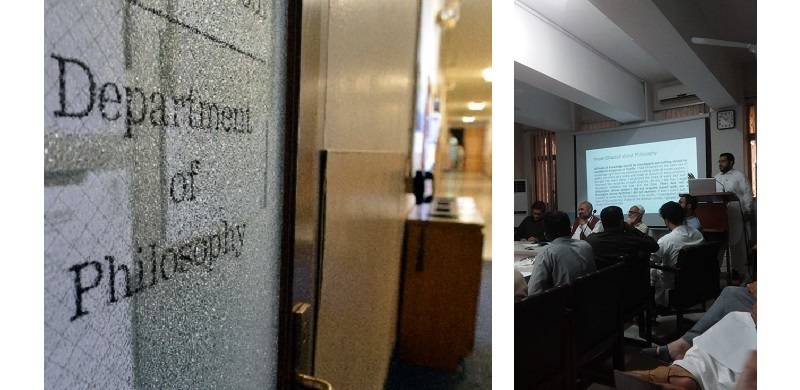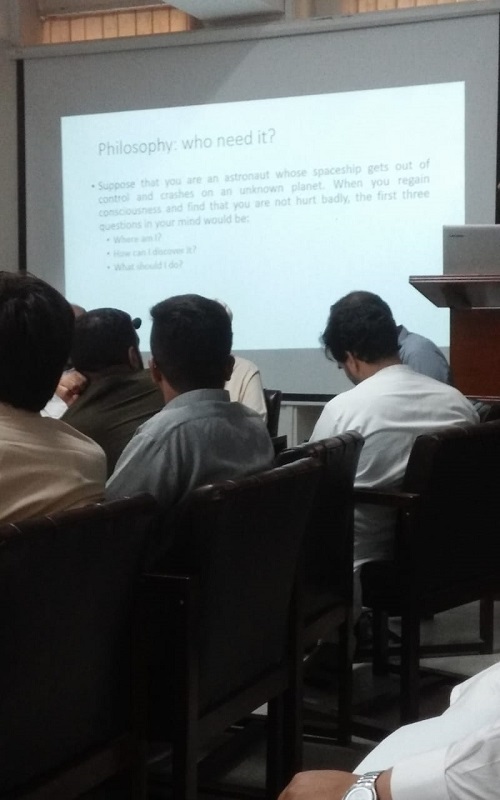
In a corner of the University of Peshawar, the Futuristic Forum, a student body at the Department of Political Science, kindled the flames of intellectual curiosity with a captivating session titled "Why Philosophy: Some Reflections on the History, Need, and Scope of Philosophy." Esteemed speakers, including Dr Mohsin Habib, a civil servant with a deep passion for philosophy, and Sayed Hussain Shaheed Sohrawardi, a renowned political scientist and teacher at the university's Department of International Relations, took the stage, bringing forth an intellectual feast for the audience.
Philosophy, the oldest subject among all academic disciplines, has often been overshadowed in our country by other fields promising a financially secure future, such as medicine and engineering. However, the allure of wisdom and the pursuit of truth has never ceased to captivate students from diverse backgrounds. While the Western world boasts figures like Karl Popper and Bertrand Russell who have contributed immensely to philosophical thought, we, too, yearn to nurture our own intellectual luminaries.
The event defied expectations as it drew an impressive number of students, reflecting their profound interest in unravelling the philosophical foundations of human thought and reason. The calibre of their questions and their genuine engagement with abstract ideas left a lasting impression on Dr Sohrawardi. He confessed that he had not anticipated such a turnout, and he encouraged the organisers of the Futuristic Forum to continue their efforts, urging them to hold similar events regularly across all departments. Drawing from his experiences in European countries, where such events are a cultural norm, he emphasised that they not only attract students but also men and women from civil society. Events like these serve as an antidote to social maladies like dogmatism and mental stagnation.
Reflecting on the broader significance of such gatherings, Dr Sohrawardi lamented, "In the ancient city-states of Greece, these events were held. They flourished in Baghdad and Alexandria, giving us luminaries like Ibn Rushd and Ibn Sina (Avicenna). But today," he sighed, "such events have migrated to the pubs and cafes of Europe, while our thoughts remain tightly noosed." He argued that our country's failure to produce serious philosophers, theorists, or esteemed intellectuals stems from the neglect of philosophy within academia and the reluctance to engage in intellectual discourse in our society.
Both speakers mesmerised the audience with their erudition and profound insights. University students from various departments comprised the majority of attendees, eagerly participating in the discussion by posing thought-provoking questions and exploring the diverse subfields of philosophy, including ethics, religion, politics, and the social and physical sciences.
As the event concluded, attendees were treated to refreshments, and an exciting announcement filled the air: "The Peshawar Debates," a new series of interactive talks, is set to take place at the Institute of Educational Research (IER), University of Peshawar soon.
The efforts of the event's organisers were met with admiration and applause from the attendees, who expressed their eagerness to participate in similar intellectual gatherings in the future.
In a world where the pursuit of material success often overshadows the love of wisdom, events like these stand as beacons, reminding us of the intrinsic value of intellectual exploration. The University of Peshawar has become a bastion of intellectual growth, fostering an environment where students can dare to question, challenge prevailing notions, and embark on a lifelong journey of seeking truth and understanding.
As we continue to cultivate intellectual curiosity and encourage the exploration of philosophy, we hold the key to unlocking the door to a brighter future—one illuminated by the profound insights of our own philosophers and intellectuals.
Philosophy, the oldest subject among all academic disciplines, has often been overshadowed in our country by other fields promising a financially secure future, such as medicine and engineering. However, the allure of wisdom and the pursuit of truth has never ceased to captivate students from diverse backgrounds. While the Western world boasts figures like Karl Popper and Bertrand Russell who have contributed immensely to philosophical thought, we, too, yearn to nurture our own intellectual luminaries.
The event defied expectations as it drew an impressive number of students, reflecting their profound interest in unravelling the philosophical foundations of human thought and reason. The calibre of their questions and their genuine engagement with abstract ideas left a lasting impression on Dr Sohrawardi. He confessed that he had not anticipated such a turnout, and he encouraged the organisers of the Futuristic Forum to continue their efforts, urging them to hold similar events regularly across all departments. Drawing from his experiences in European countries, where such events are a cultural norm, he emphasised that they not only attract students but also men and women from civil society. Events like these serve as an antidote to social maladies like dogmatism and mental stagnation.
Philosophy, the oldest subject among all academic disciplines, has often been overshadowed in our country by other fields promising a financially secure future
Reflecting on the broader significance of such gatherings, Dr Sohrawardi lamented, "In the ancient city-states of Greece, these events were held. They flourished in Baghdad and Alexandria, giving us luminaries like Ibn Rushd and Ibn Sina (Avicenna). But today," he sighed, "such events have migrated to the pubs and cafes of Europe, while our thoughts remain tightly noosed." He argued that our country's failure to produce serious philosophers, theorists, or esteemed intellectuals stems from the neglect of philosophy within academia and the reluctance to engage in intellectual discourse in our society.
Both speakers mesmerised the audience with their erudition and profound insights. University students from various departments comprised the majority of attendees, eagerly participating in the discussion by posing thought-provoking questions and exploring the diverse subfields of philosophy, including ethics, religion, politics, and the social and physical sciences.

As the event concluded, attendees were treated to refreshments, and an exciting announcement filled the air: "The Peshawar Debates," a new series of interactive talks, is set to take place at the Institute of Educational Research (IER), University of Peshawar soon.
The efforts of the event's organisers were met with admiration and applause from the attendees, who expressed their eagerness to participate in similar intellectual gatherings in the future.
In a world where the pursuit of material success often overshadows the love of wisdom, events like these stand as beacons, reminding us of the intrinsic value of intellectual exploration. The University of Peshawar has become a bastion of intellectual growth, fostering an environment where students can dare to question, challenge prevailing notions, and embark on a lifelong journey of seeking truth and understanding.
As we continue to cultivate intellectual curiosity and encourage the exploration of philosophy, we hold the key to unlocking the door to a brighter future—one illuminated by the profound insights of our own philosophers and intellectuals.

